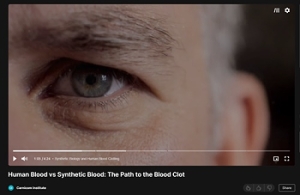Cross Domain Bacteria and Synthetic Biology Equivalence:
Blood Clots, Skin Affliction & Polymers
Clifford E Carnicom
Dec 31 2023
The equivalence of the impact of synthetic biology upon the blood and skin is again established. This equivalence is not limited to blood and skin, but distributes itself across human biology in general.
The progression of a xenobiotic microbe to increase blood clotting has recently been outlined in both written and video form. These are available at:
Human Blood vs. Synthetic Blood : The Path to the Blood Clot (5 min video, Dec 2023)
Human Blood vs. Synthetic Blood : The Path to the Blood Clot (article, Dec 2023)
For those that wish to retain a fictional or comfort version of the reality now upon us, some laboratory study might be helpful. Another starting point would be the exploration of the publicly disclosed activity and achievements in synthetic biology. Condemnation without appropriate effort is a hindrance to the truth and urgent progress required. It is no exaggeration that human biology is under siege.
This paper will continue to unveil the needless suffering that has taken place over recent decades, and the increase of that suffering to a state that is now harder to conceal. The summary phrase here might be that of skin, blood, and more frequent death.
The case has been made that the biological harm done to those classified under the condition known as “Morgellons” is of the same nature as that evident in increased blood clotting over recent years. The previous work mentioned will outline that case.
This paper will specifically look at an example of a surface skin manifestation of this “condition” and compare it to the the known properties of the Cross Domain Bacteria (CDB). It is mentioned again that this nomenclature exists only because of the extended failures of the health professionals to address the issues. Maybe this will be remedied some day and Latin will make its mark (remember cirrus aviaticus?), but the abhorrent neglect remains. It is true that it is beyond the comfort zone of most all of us, and it should be.
There are two tools (minimum) we can use here to fairly easily make the case for equivalency between skin and blood “problems”. Visual and spectroscopy.
The formation of “vinyl” polymers, or bioplastic chemical groups are at the heart of the metabolic activity of the CDB. This is a primary synthetic biology signature that cannot be ignored or dismissed. Plastics and polymers produced by a genetically engineered microbe should not be in the body. Fairly simple on that matter. Synthetic blood production is another fact to deal with. When we get to the point of stopping these processes (among others), as soon as possible, then we can work on the psychology and comfort zone of it all.
Here is an example of the skin condition that we can take as representative of the problem. As mentioned, the blood clotting situation has been addressed in some detail within previous papers. Here we will focus on observable and measurable damaged skin conditions with an eye to compare the two.
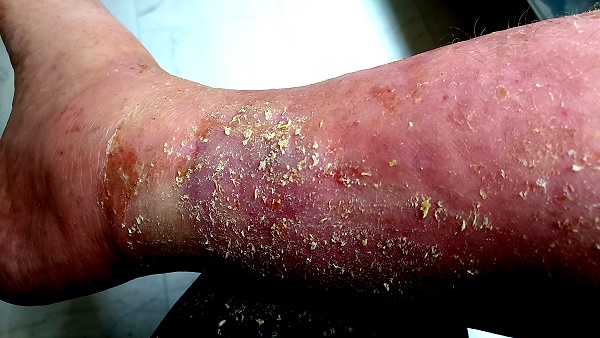
Photo 1
CDB impact upon skin (relatively severe)
(approximate duration 1 1/4 years)
(Colloquially known as “Morgellons” – nomenclature discussion)
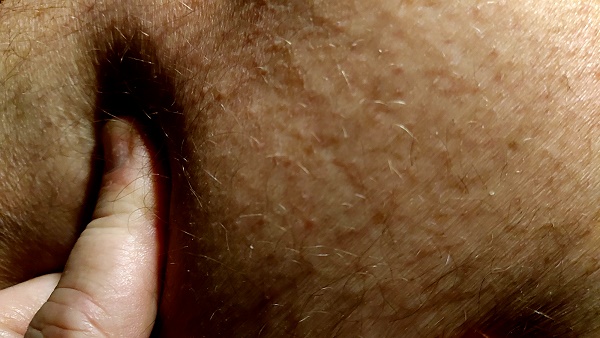
Photo 2
Demonstration of “normal” skin behavior under mild turgor pressure
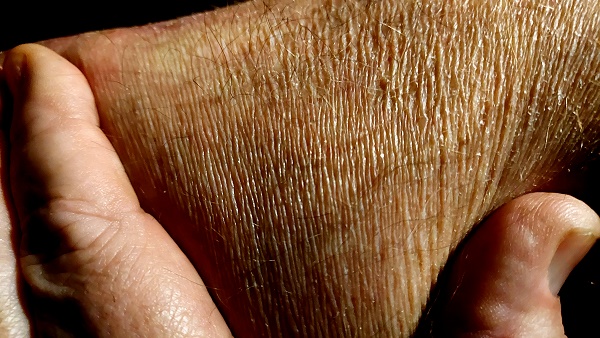
Photo 3
Demonstration of immediately adjacent skin (to Photo 1) behavior under mild turgor pressure
The primary observations of importance here concern visible appearance, texture and moisture of the affected skin. A long gestation period (years) results in what is observed above. Years may also be involved in affecting or effecting change as well. Surface presence of the condition itself is an important status indicator, as the polymeric chemistry evolves much deeper within the body and certainly beneath the skin.
From the visible side alone, the severely affected skin does indeed have a “plastic” sheen and nature to it. The turgor pressure observations as well as scale formation does indicate a significant decrease in the moisture level and elasticity of the skin. The texture of the skin coincides with all of the above observations.
Now let’s go to a method that is more independent of the observer, Near Infrared Spectroscopy (NIR). NIR is able to tell us about the general chemical nature of many compounds, and it operates at the molecular level (smaller than nanotechnology). There are many varieties of spectroscopy, and it is to be acknowledged that spectroscopy and interpretation is a profession in its own right.
The purpose of the NIR plot below is to seek information about any differences between visibly normal skin and that shown in Photo 1 above.
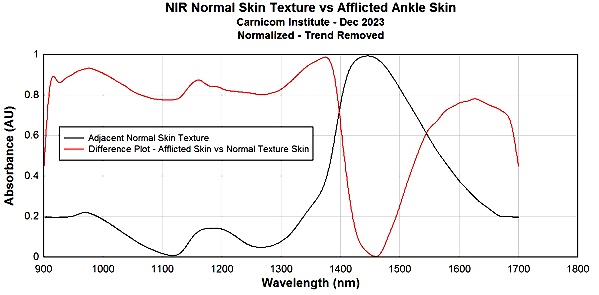
NIR comparison between visibly “normal” skin and CDB affected skin
No special importance should be attached to the magnitude of the graph; it is the profile and shape of the graph that is under consideration here.
There are three points of interest from the examination of this plot, and they all involve differences between what will be called normal and affected skin. The black line depicts the absorption of NIR energy by normal skin, the red line depicts absorption by the affected skin compared to normal skin. The red line is therefore a difference NIR plot, using normal skin as the reference.
The differences concern water, and what are called methyl and vinyl “functional groups” (i.e, building blocks of organic chemistry). Knowledge of the existence or absence of functional groups is an important analysis tool of organic chemistry in general.
At a semi lay level, what is inherent in the plot above is (ref. Practical Guide and Spectral Atlas for Interpretive Near-Infrared Spectroscopy, CRC):
1. The affected skin has significant moisture removed from the area. (Skin cannot function without adequate water.)
2. The affected skin shows the strong presence of vinyl groups. (This means polymerization and bioplastics integrated within the skin). As mentioned, vinyl functional groups are at the core of the CDB metabolism and polymerization within the body.
3. The decline or interruption of methyl groups is appearing within the affected skin. Methylation of the human body is an incredibly important topic worthy of much additional discussion in the future. However, it can be said that the interruption or decline of methylation in the body would logically favor increased polymer formation, i.e., bioplastics.
The lesson here is that we can no longer confine ourselves to a certain particular topic of interest that might be more concerning or popular at the time. Examples of these include blood clotting, “Morgellons”, purported “vaccines”, electromagnetic field influence, etc.. They are all part and parcel of a much deeper and longer problem that transcends each individual concern. There are close to three decades of accumulation of data thus far, should you care to examine it.
It will be found, under sufficient study, that each of these topics share a common theme, as the CDB are in common ground with each one of them, as well as others unspoken. Other CI provided research papers confirm this conclusion.
The favorable side of our situation, as difficult as it might be to imagine, is that specific knowledge such as the above will lead to greater confidence and skill in battle. It is your decision if and how you are to join.
Clifford E Carnicom
Dec 31 2023
Born Clifford Bruce Stewart, Jan 19 1953.

